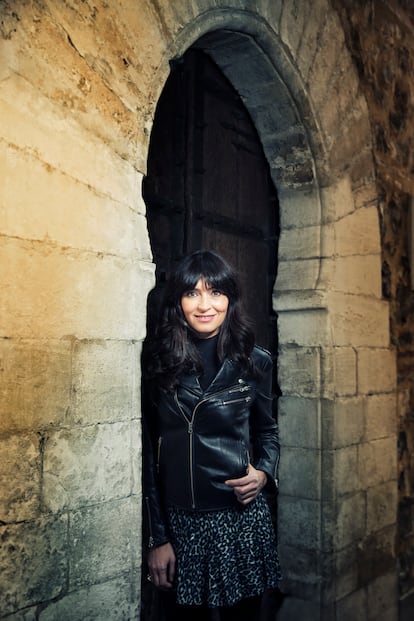‘Shakespeare is the best liar’: New book tells tales of history’s greatest tricksters
The volume presents a compilation of the most prominent deceptions in the annals of humanity – and the people behind them

Impostors, deceivers, pretenders... a new book by Spanish journalist and writer Marta Fernández, entitled La mentira (The lie), has gathered a selection of the most notorious deceptions carried out in recent human history. The guy who sold the Eiffel Tower to a scrap dealer is there, along with the young man who claimed to have found a long-lost Shakespeare work and the fake diary of Adolf Hitler. Maybe their noses did not grow like Pinocchio’s, but most of their stories certainly did not have happy endings.
Question. What moved you to tell the stories of liars?
Answer. We keep hearing that we live in the era of post-truth and fake news, while in reality this has always been the case. Adam and Eve with the snake and the Trojan horse were all fake news. I thought it was time to vindicate the great impostors; some have been quite funny.
Q. What criteria did you follow to choose them?
A. I already liked almost all the ones I chose, because they were mischievous or brilliant or evil. I also wanted them to not be very modern.
Q. Which is your favorite?
A. I really like literary impostors, like William Henry Ireland, who forged a Shakespeare play to win his father’s affection. It became the biggest failure of the English stage; they weren’t even able to finish the first performance in London [in April 1796] because it was so bad – even the lead actor kept laughing.
Q. Why do you state in your book that fiction is the most beautiful lie?
A. Because that is the way to make the lie respectable, both for authors and readers. The myths on which societies are created are great foundational lies, even if we are aware that we are being lied to.
Q. Which writer has been particularly deceitful in their work?
A. Precisely Shakespeare is the best liar. Besides, he was an accomplished plagiarist of his contemporaries, and lying is at the core of his works, with comedies of errors, cross-dressing…
Q. Have you come to any conclusion as to why we lie with such ease?
A. Speaking with [paleontologist] Juan Luis Arsuaga, he said that we would not exist as a society without lies. I was interested to know why we fall for the most bizarre stories, as the liars would not exist without the gullible. We believe so many things because life is easier that way. It would be horrible to doubt everything all the time.

Q. What makes a good lie?
A. The successful ones are those that start from a seed of truth. Victor Lustig is the patron saint of scammers: he sold the Eiffel Tower to a scrap dealer because in the 1920s there was a rumor going around in Paris saying that the monument was going to be disassembled because it was actually temporary.
Q. Are there many untruths in the press?
A. That it is the paradox of the journalist. We want to find out where the truth is, but there are lies that reach the media because of our own mistakes. For example, the story about Orson Welles causing a panic throughout the United States with his War of the Worlds broadcast is not true. It was made up by the press because it wanted to discredit a new and free medium: radio.
Q. Even the famous German weekly Stern published some alleged Hitler diaries that were fake.
A. It was a scandal; the German government was forced to intervene. While researching that chapter, I saw how the editorial meetings went and some journalists were not interested in discovering the truth. They wanted to have the biggest exclusive of the century, and the truth was not going to spoil it for them.
Q. What big fat lie have you been told? Did you believe it?
A. To be at peace with my past, sometimes I prefer to forget the truth and keep the lie that I was told.
Q. Could you tell us a little lie of yours?
A. Like when you run into an old university classmate that you have not seen in a long time and you say they look great and you should get together sometime for a drink or something.
Q. There is such a thing as a nice guy face; is there a trickster appearance?
A. They are usually very good listeners. They are seductive, as they know what you want to hear. There are studies that state children who lie more have more social skills when they grow up.
Q. Most cases in your book are from the US and the UK. Are there more liars in the English-speaking world?
A. The belief that Hispanic people are particularly deceitful had to be rectified. Besides, I have a fondness for the English-speaking world, and access to documentary sources in public libraries is easier in those countries.
Q. You quote a study from the University of Massachusetts according to which two strangers can lie to each other up to three times in 10 minutes. We have been chatting for almost 20…
A. [Laughs] The study also mentioned that the lying had no purpose, it didn’t have to be a job interview or a date. You just need to find somebody with whom you want to make your achievements sound more impressive.
Sign up for our weekly newsletter to get more English-language news coverage from EL PAÍS USA Edition
Tu suscripción se está usando en otro dispositivo
¿Quieres añadir otro usuario a tu suscripción?
Si continúas leyendo en este dispositivo, no se podrá leer en el otro.
FlechaTu suscripción se está usando en otro dispositivo y solo puedes acceder a EL PAÍS desde un dispositivo a la vez.
Si quieres compartir tu cuenta, cambia tu suscripción a la modalidad Premium, así podrás añadir otro usuario. Cada uno accederá con su propia cuenta de email, lo que os permitirá personalizar vuestra experiencia en EL PAÍS.
¿Tienes una suscripción de empresa? Accede aquí para contratar más cuentas.
En el caso de no saber quién está usando tu cuenta, te recomendamos cambiar tu contraseña aquí.
Si decides continuar compartiendo tu cuenta, este mensaje se mostrará en tu dispositivo y en el de la otra persona que está usando tu cuenta de forma indefinida, afectando a tu experiencia de lectura. Puedes consultar aquí los términos y condiciones de la suscripción digital.









































